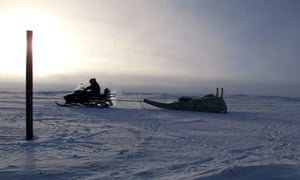Winter reads: The Left Hand of Darkness by Ursula K Le Guin | Books | The Guardian
Winter reads: The Left Hand of Darkness by Ursula K Le Guin
This Hugo-winning tale of an icebound planet is as remarkable for its subtley revolutionary portrait of a world in which gender is not fixed as it is for Le Guin's chilling descriptions of whirling snow and bitter cold
Justine Jordan
Tue 27 Dec 2011 20.00 AEDTFirst published on Tue 27 Dec 2011 20.00 AEDT
Shares
161
Comments2
 'The most extraordinary part of the book is the section in which the Genly Ai and Estraven make an arduous three-month trek through arctic wastes ... ' Photograph: Jack Smith/AP
'The most extraordinary part of the book is the section in which the Genly Ai and Estraven make an arduous three-month trek through arctic wastes ... ' Photograph: Jack Smith/APWhat if there were no gender – if humans only took on male or female characteristics when they went into heat once a month, and sex was kept separate from everything else? What would a society without the dualism of male and female look like? This was the "thought experiment" Ursula K Le Guin embarked on in her 1970 Hugo award winner, The Left Hand of Darkness.
It's a normal man who introduces us to these genderless humans: Genly Ai, an envoy from the federation of planets, who has come to this icebound planet, Gethen or "Winter", to break the news that there is life beyond the stars. He brings with him the standard prejudices of a gendered society, essentially seeing the Gethenians as distastefully effeminate men. He notes that though their society is rife with politicking, double-dealing and status anxiety, it has never mobilised into war - "they behaved like animals, in that respect; or like women. They did not behave like men, or ants." A different off-planet investigator makes the very good point that in a society where all can and do fall pregnant, "nobody here is quite so free as a free male anywhere else".
But perhaps it's not the lack of a male gender that keeps the peace, but the ice age that has Winter in its grasp: "perhaps they use up their fighting spirit fighting the cold". The Left Hand of Darkness has some of the most chilling descriptions of chilly conditions you'll find in fiction; the reader and poor Genly Ai, who like us comes from a milder planet, very rarely get warm. One Gethenian creation myth begins, "In the beginning, there was nothing but ice and the sun." There are many precise and evocative words for snow: <i>bessa</i>, soft new-fallen snow; <i>esyot</i>, granular snow; <i>neserem</i>, "heavy snowfall on a moderate gale". It is hard work to stay alive. With only a "lowgrade" diet of nuts, grains and fish, Gethenians must constantly refuel; travel is slow and arduous; people are often snowed in, totally cut off from the rest of the world.
Advertisement
Isolation and exile are the novel's great subjects; the solitude of snow, a mental space Le Guin calls "the heart of the blizzard". The politician Estraven, who takes up Genly Ai's cause, is exiled from his country – harsh punishment indeed in such a hostile terrain. Genly Ai, who has survived two hard winters on Winter already, is in exile from his home and his whole way of thinking. The most extraordinary part of the book is the section in which the two of them make an arduous three-month trek through arctic wastes to get back to Estraven's country and contact Genly Ai's spaceship. Out on the ice, with only sledge and tent, they are "equals at last, equal, alien, alone". Their survival is a miracle – and also a feat of human ingenuity, planning, and determination. Le Guin describes the howling gales too loud to shout over; the white-outs in which all sense of direction disappears; the rations painfully eked out; how hard it is simply to breathe at 40 or 50 below. In this wilderness the two aliens also find an unlikely love that they don't even try to gender, a moment of connection that transcends time to form the centre of a life: "the enduring moment, the hearth of warmth ... Outside, as always, lies the great darkness, the cold, death's solitude."
Le Guin does not sentimentalise, or even consummate, this love; it's not inflated, as love stories so often are, to dominate her themes of society and environment. But it is given its due individual weight. "I'm not trying to say that I was happy, during those weeks of hauling a sledge across an ice-sheet in the dead of winter," writes Genly Ai. "I certainly wasn't happy. Happiness has to do with reason, and only reason earns it. What I was given was the thing you can't earn, and can't keep, and often don't even recognise at the time; I mean joy."
The novel fails to surmount one major obstacle: the male pronoun used of the Gethenians. But it does not set out to be prescriptive, or definitive about gender – if it were, it would have dated horribly. Le Guin is much more subtle and ambiguous than that, more interested in questions than answers and aware of what a Gethenian mystic with the gift of foresight calls "the perfect uselessness of knowing the answer to the wrong question". As she puts it in her foreword to the 40th anniversary edition, "I did the best I could, working at the hinge point, the moment the change was happening, when what I wrote was part of the change that was happening."
No comments:
Post a Comment
Note: Only a member of this blog may post a comment.